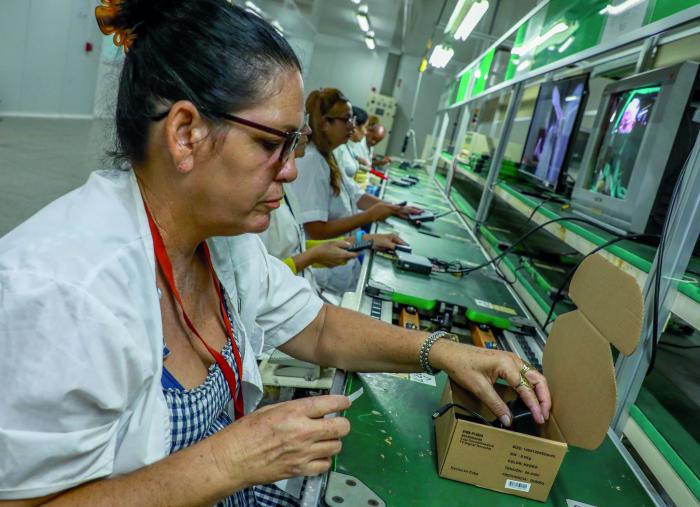The principle of demonstrated capacity, based on competency management, governs incorporation into employment and permanence in the post
The development of collective labour relations, decisions in state business entities and budgeted institutions, as well as judicial, institutional and trade union mechanisms for the recognition of labour rights, are some of the sections addressed by the Draft Bill of the Labour Code; submitted, from this Monday, to public consultation among Cuban workers.
To learn about the novelties introduced by the new legal body, Granma spoke with Olgalidi Alapon Travieso, an expert from the Legal Directorate and International Relations of the Ministry of Labour and Social Security (MTSS).
Alapon Travieso specified, as a positive aspect, that the legislation establishes that in the non-state sector the types of contracts provided for in the Labour Code will be applied, according to the nature of the activity carried out.
Regarding unpaid leave, she explained that, in cases of travel abroad during the holiday period due to unforeseen situations that prevent immediate return to the country, the head of the entity –“making use of his discretionary power”– may approve an exceptional extension, provided it does not exceed the calendar year, after evaluating the presented causes.
Likewise, that discretionary power is applied for the attention and care of family members in a situation of dependency, when this is not possible in an institution of the National System for Comprehensive Life Care. In these cases, the granting of unpaid leave is recognised as a right.
Regarding recently graduated persons, the expert referred that, when there is no possibility of a job position in the state sector, “it is established that they may be placed in the non-state sector”; and during the period of social service compliance, they may pursue further studies abroad for personal interest associated with their professional profile.
WORK IN THE NON-STATE SECTOR
The legal specialist of the MTSS stated that persons working in the non-state sector have guaranteed protection of their income, “through the insurance policy that employers must contract, intended to finance wage guarantees in case of labour interruption; cessation of the labour relationship for economic, technological and structural reasons; dissolution and cancellation of the MSME; temporary closure; prohibition to develop certain activities or businesses and any of the criminal penalties applicable to legal persons”.
Similarly, they have the right to receive the labour and wage treatments provided for by the Law in situations of disasters; mobilisations of interest for national defence and security; as well as national commemoration days, holidays and additional paid recess days.
Alapon Travieso noted that, “when the exercise of the employer’s activity is temporarily suspended, he pays the contracted workers a wage guarantee equivalent to one month of the wage fixed in the contract. And when the cause that originated the suspension ceases, the workers contracted for an indeterminate time have a preferential right to be reincorporated into the activity in which they were contracted.”
Although not subject to a subordinate labour relationship, the draft bill also regulates the figure of the self-employed worker who works without subordination to an employer, and does not have other persons working under their dependence: “rights are provided for in the exercise of the activity to be developed such as access to authorisation, receiving responses within the timeframes provided by law, being heard and accessing the judicial route when they consider their rights have been violated.”
TELEWORK
Among the characteristics of telework, it is specified that the performance of those who work will be evaluated by results, according to the nature of the functions they perform. For this, the schedule in which the worker will be available for the employer must be defined, “always respecting the maximum limits of the daily and weekly working day agreed,” detailed Alapon Travieso.
Likewise, it is foreseen that the Collective Labour Agreement must include the mechanisms for the worker to exercise the right of reversibility, which consists of being able to return to in-person work at the entity, whether at their own request or when the employer determines, with notified grounds, that the proposed objectives have not been reached.
Another novelty is that workers may negotiate with the employer the use of remote work or telework when personal circumstances, mobility limitations due to disability or care responsibilities for dependent family members coincide.
Furthermore, it is established that those who travel abroad for private matters may continue working through telework during the authorised period, provided the conditions and characteristics of the work allow it. “For this, a supplement to the labour contract will be signed which will include the necessary adaptations regarding conditions and delivery deadlines, security measures, payment of remuneration, other labour rights and the control that the employer will exercise.”
FOR PERSONS IN A SITUATION OF DISABILITY
In accordance with the principle of non-discrimination, all persons are guaranteed equal labour opportunities and fair treatment in the workplace. Therefore, to promote labour inclusion of persons in a situation of disability, the employer has the obligation to make reasonable adjustments that facilitate their access, mobility and professional development, allowing them to perform the posts for which they are prepared.
According to Alapon Travieso, “persons in a situation of disability, as well as graduates of special education, have priority for access to employment according to the existing possibilities in each municipality.
“In that sense, they will receive training in the job post for a period of up to six months, during which they will receive a payment equivalent to the wage of the post they are going to perform.”
Furthermore, the right to request and agree on the use of remote work or telework is granted and, in that case, the means or equipment must have a universal design, for the purpose of avoiding any exclusion for this reason.
ON INCOME IN THE EVENT OF INTERRUPTIONS OR CONTRACT CESSATIONS
“In the event of the interruption of labour activities, the employer must identify the cause and determine if it is attributable or not to any worker. Then, by common agreement with the trade union organisation, they must relocate the workers to other posts in the entity or in tasks aimed at re-establishing the activity, provided they are fit for it,” explained the legal specialist.
As part of the wage treatment, workers who are awaiting the re-establishment of the production process will receive the basic wage of their post. If they are temporarily relocated, the remuneration will be that of the post they move to perform.
“In the case that relocation is not possible, the person will receive a wage guarantee equivalent to 100% of their daily basic wage, for a period of 24 working days, which is paid from the insurance policy contracted by the employer.”




